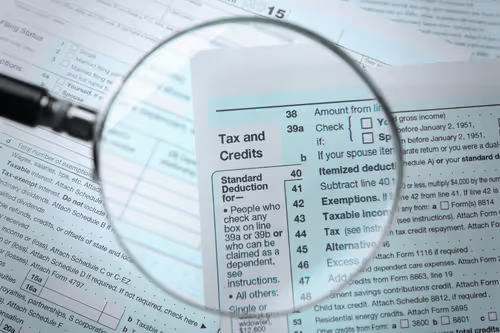4 Things to Do before Filing Your Tax Return
Tax season is in full swing, and most people are getting their returns ready to file. If you’re one of those people who likes to file early, you might be rushing to get that return out the door so that you can get it processed more quickly (and perhaps get your refund that much sooner). However, there are a few things that you should do before you send in your tax return.
Double Check Your Work
Just as you were taught in every math class growing up, you should always check your work before turning it in. The same goes for your taxes. Before you click “submit” on your electronic filing, or you seal and stamp that envelope to send to the IRS, double check that everything is in order:
- Do you have all the right forms and schedules included?
- Have you included all of the necessary information, including all sources of income?
- If submitting a paper return, is the writing on the form clearly legible?
- Are all of the calculations accurate?
A forgotten form or a small mathematical error can lead to major issues with the IRS, so you don’t want to miss any details. Often, this is a primary reason that taxpayers seek professional tax prep services, as it greatly reduces the risks of encountering such errors.
Document All Deductions
While the paperwork supporting all of your tax deductions doesn’t need to be included with your submitted return, it is important to ensure that you have all of those documents in order prior to filing. Only about 1% of tax returns are audited, but if your return is selected for an audit, it will often be a “mail audit”; this means you simply need to mail in the proper documentation to support your claimed deduction, and the audit will be over. So, you want to make sure to have those organized and in an accessible location before you file the return, in case you need them.
You should also be aware that certain situations are a “red flag” to the IRS and will make you much more likely to be selected for an audit. These include:
- Deducting square footage as a home office
- Deducting business-related vehicle expenses
- A large number of deductions
- Larger-than-average deductions
If you have any of these “red flags” on your tax return, it is doubly important that you can offer supporting documentation for all of the deductions you’ve claimed.
Make Plans for Payment
Whether you need to send a payment or you’re expecting a return, be sure that you’ve worked out how payment will be sent or received. If you owe money to the IRS, you can make your payment via check, credit card, or debit card; however, the latter two options come with an added processing fee, so sending in a check is usually the cheapest option.
Additionally, if you owe a large amount to the IRS, and you can’t afford to pay it all in one lump sum, look into setting up a payment plan before you file. This will help you to work out all of the payment details to ensure that you don’t have any non-payment fees tacked onto your tax bill. If you’re not sure how to do this, or you’re worried about handling it properly, a CPA can easily do this for you.
If you’re one of the lucky individuals receiving a tax refund, make sure that you set up how you would like to receive your payment. Typically, you can do this via a check in the mail or with direct deposit; the latter will be the fastest way to get access to those funds.
Crosscheck Federal and State Returns
When you file your taxes, you’re usually filing two tax returns—one for federal and one for state. State tax authorities and the IRS communicate very closely with one another and will often verify and crosscheck numbers between your two (or more, if you have income in multiple states) returns. It’s important to crosscheck these returns against each other and ensure the numbers line up appropriately.
This can get a bit complicated, because states have their own income tax laws. So, in most cases, the numbers on your state return should match those on your federal return. But in other cases, the numbers will be different due to different laws regarding taxable income. You should be aware of the differences in state and federal tax law, so you know where the numbers on your two returns should match, and where they should vary.
So before you file your tax return, be sure to do the 4 things mentioned above. And if it seems like too much, or you’re worried that you’re not getting every deduction possible on your return, contact us for professional tax prep services.
%20(1).avif)
Peter Demian is a highly-rated CPA specializing in accounting and tax services for individuals and businesses across 49 states. He offers expertise in tax strategies and assistance with IRS settlements.


.svg)





